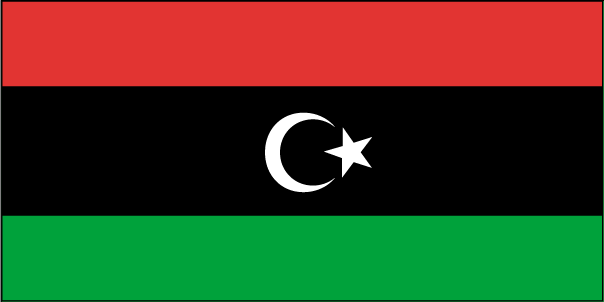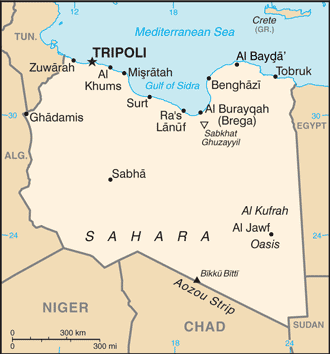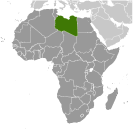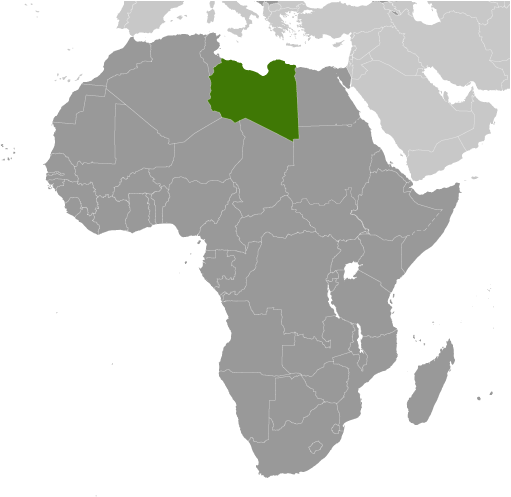|

Administrative divisions (GPS Maps)
Geography
People and Society
Government
Economy
Communications
Transportation
Military |
 |
 The Italians supplanted the Ottoman Turks in the area around Tripoli in 1911 and did not relinquish their hold until 1943 when defeated in World War II. Libya then passed to UN administration and achieved independence in 1951. Following a 1969 military coup, Col. Muammar Abu Minyar al-QADHAFI began to espouse his own political system, the Third Universal Theory. The system was a combination of socialism and Islam derived in part from tribal practices and was supposed to be implemented by the Libyan people themselves in a unique form of "direct democracy." QADHAFI used oil funds during the 1970s and 1980s to promote his ideology outside Libya, supporting subversives and terrorists abroad to hasten the end of Marxism and capitalism. In addition, beginning in 1973, he engaged in military operations in northern Chad's Aozou Strip - to gain access to minerals and to use as a base of influence in Chadian politics - but was forced to retreat in 1987. UN sanctions in 1992 isolated QADHAFI politically following the downing of Pan Am Flight 103 over Lockerbie, Scotland. During the 1990s, QADHAFI began to rebuild his relationships with Europe. UN sanctions were suspended in April 1999 and finally lifted in September 2003 after Libya accepted responsibility for the Lockerbie bombing. In December 2003, Libya announced that it had agreed to reveal and end its programs to develop weapons of mass destruction and to renounce terrorism. QADHAFI subsequently made significant strides in normalizing relations with Western nations. The US rescinded Libya's designation as a state sponsor of terrorism in June 2006. In August 2008, the US and Libya signed a bilateral comprehensive claims settlement agreement to compensate claimants in both countries who allege injury or death at the hands of the other country, including the Lockerbie bombing, the LaBelle disco bombing, and the UTA 772 bombing. In October 2008, the US Government received $1.5 billion pursuant to the agreement to distribute to US national claimants, and as a result effectively normalized its bilateral relationship with Libya. The two countries then exchanged ambassadors for the first time since 1973 in January 2009. Libya in May 2010 was elected to its first three-year seat on the UN Human Rights Council, prompting protests from international non-governmental organizations and human rights campaigners. Unrest that began in several Near Eastern and North African countries in late December 2010 spread to several Libyan cities in early 2011. In March 2011, a Transitional National Council (TNC) was formed in Benghazi with the stated aim of overthrowing the QADHAFI regime and guiding the country to democracy. In response to QADHAFI's harsh military crackdown on protesters, the UN Security Council adopted Resolution 1973, which demanded an immediate ceasefire and authorized the international community to establish a no-fly zone over Libya. After several months of see-saw fighting, anti-QADHAFI forces in August 2011 captured the capital, Tripoli. In mid-September, the UN General Assembly voted to recognize the TNC as the legitimate interim governing body of Libya. The TNC on 23 October officially declared the country liberated following the defeat of the last remaining pro-QADHAFI stronghold and QADHAFI's death, and plans to transition toward elections, the formation of a constitution, and a new government. The Italians supplanted the Ottoman Turks in the area around Tripoli in 1911 and did not relinquish their hold until 1943 when defeated in World War II. Libya then passed to UN administration and achieved independence in 1951. Following a 1969 military coup, Col. Muammar Abu Minyar al-QADHAFI began to espouse his own political system, the Third Universal Theory. The system was a combination of socialism and Islam derived in part from tribal practices and was supposed to be implemented by the Libyan people themselves in a unique form of "direct democracy." QADHAFI used oil funds during the 1970s and 1980s to promote his ideology outside Libya, supporting subversives and terrorists abroad to hasten the end of Marxism and capitalism. In addition, beginning in 1973, he engaged in military operations in northern Chad's Aozou Strip - to gain access to minerals and to use as a base of influence in Chadian politics - but was forced to retreat in 1987. UN sanctions in 1992 isolated QADHAFI politically following the downing of Pan Am Flight 103 over Lockerbie, Scotland. During the 1990s, QADHAFI began to rebuild his relationships with Europe. UN sanctions were suspended in April 1999 and finally lifted in September 2003 after Libya accepted responsibility for the Lockerbie bombing. In December 2003, Libya announced that it had agreed to reveal and end its programs to develop weapons of mass destruction and to renounce terrorism. QADHAFI subsequently made significant strides in normalizing relations with Western nations. The US rescinded Libya's designation as a state sponsor of terrorism in June 2006. In August 2008, the US and Libya signed a bilateral comprehensive claims settlement agreement to compensate claimants in both countries who allege injury or death at the hands of the other country, including the Lockerbie bombing, the LaBelle disco bombing, and the UTA 772 bombing. In October 2008, the US Government received $1.5 billion pursuant to the agreement to distribute to US national claimants, and as a result effectively normalized its bilateral relationship with Libya. The two countries then exchanged ambassadors for the first time since 1973 in January 2009. Libya in May 2010 was elected to its first three-year seat on the UN Human Rights Council, prompting protests from international non-governmental organizations and human rights campaigners. Unrest that began in several Near Eastern and North African countries in late December 2010 spread to several Libyan cities in early 2011. In March 2011, a Transitional National Council (TNC) was formed in Benghazi with the stated aim of overthrowing the QADHAFI regime and guiding the country to democracy. In response to QADHAFI's harsh military crackdown on protesters, the UN Security Council adopted Resolution 1973, which demanded an immediate ceasefire and authorized the international community to establish a no-fly zone over Libya. After several months of see-saw fighting, anti-QADHAFI forces in August 2011 captured the capital, Tripoli. In mid-September, the UN General Assembly voted to recognize the TNC as the legitimate interim governing body of Libya. The TNC on 23 October officially declared the country liberated following the defeat of the last remaining pro-QADHAFI stronghold and QADHAFI's death, and plans to transition toward elections, the formation of a constitution, and a new government. |
|
Advertisements
|
Advertisements
|
Telephones - main lines in use World Ranking: 71
1.228 million (2009)
Telephones - mobile cellular World Ranking: 67
10.9 million (2009)
Telephone system
General assessment Telecommunications system is state-owned and service is poor, but investment is being made to upgrade; state retains monopoly in fixed-line services; mobile-cellular telephone system became operational in 1996 Domestic Multiple providers for a mobile telephone system that is growing rapidly; combined fixed-line and mobile-cellular teledensity has soared approaching 190 telephones per 100 persons in 2010 International Country code - 218; satellite earth stations - 4 Intelsat, NA Arabsat, and NA Intersputnik; submarine cable to France and Italy; microwave radio relay to Tunisia and Egypt; tropospheric scatter to Greece; participant in Medarabtel (2009)
Broadcast media
State controls broadcast media; state-owned terrestrial TV station and about a half-dozen state-owned satellite stations; some provinces operate local TV stations; a single, non-state-owned TV station launched in 2007; pan-Arab satellite TV stations are available; state-owned radio broadcasts on a number of frequencies, some of which carry regional programming; Voice of Africa, Libya's external radio service, can also be heard; a single, non-state-owned radio station broadcasting (2007)
Internet country code
.ly
Internet hosts World Ranking: 122
17,787 (2010)
Internet users World Ranking: 124
353,900 (2009)
--- There are no comments yet ---
Add a new comment:
|
Advertisement
Members area
Libya (Tripoli):
GPS points from Libya (Tripoli)
|




 The Italians supplanted the Ottoman Turks in the area around Tripoli in 1911 and did not relinquish their hold until 1943 when defeated in World War II. Libya then passed to UN administration and achieved independence in 1951. Following a 1969 military coup, Col. Muammar Abu Minyar al-QADHAFI began to espouse his own political system, the Third Universal Theory. The system was a combination of socialism and Islam derived in part from tribal practices and was supposed to be implemented by the Libyan people themselves in a unique form of "direct democracy." QADHAFI used oil funds during the 1970s and 1980s to promote his ideology outside Libya, supporting subversives and terrorists abroad to hasten the end of Marxism and capitalism. In addition, beginning in 1973, he engaged in military operations in northern Chad's Aozou Strip - to gain access to minerals and to use as a base of influence in Chadian politics - but was forced to retreat in 1987. UN sanctions in 1992 isolated QADHAFI politically following the downing of Pan Am Flight 103 over Lockerbie, Scotland. During the 1990s, QADHAFI began to rebuild his relationships with Europe. UN sanctions were suspended in April 1999 and finally lifted in September 2003 after Libya accepted responsibility for the Lockerbie bombing. In December 2003, Libya announced that it had agreed to reveal and end its programs to develop weapons of mass destruction and to renounce terrorism. QADHAFI subsequently made significant strides in normalizing relations with Western nations. The US rescinded Libya's designation as a state sponsor of terrorism in June 2006. In August 2008, the US and Libya signed a bilateral comprehensive claims settlement agreement to compensate claimants in both countries who allege injury or death at the hands of the other country, including the Lockerbie bombing, the LaBelle disco bombing, and the UTA 772 bombing. In October 2008, the US Government received $1.5 billion pursuant to the agreement to distribute to US national claimants, and as a result effectively normalized its bilateral relationship with Libya. The two countries then exchanged ambassadors for the first time since 1973 in January 2009. Libya in May 2010 was elected to its first three-year seat on the UN Human Rights Council, prompting protests from international non-governmental organizations and human rights campaigners. Unrest that began in several Near Eastern and North African countries in late December 2010 spread to several Libyan cities in early 2011. In March 2011, a Transitional National Council (TNC) was formed in Benghazi with the stated aim of overthrowing the QADHAFI regime and guiding the country to democracy. In response to QADHAFI's harsh military crackdown on protesters, the UN Security Council adopted Resolution 1973, which demanded an immediate ceasefire and authorized the international community to establish a no-fly zone over Libya. After several months of see-saw fighting, anti-QADHAFI forces in August 2011 captured the capital, Tripoli. In mid-September, the UN General Assembly voted to recognize the TNC as the legitimate interim governing body of Libya. The TNC on 23 October officially declared the country liberated following the defeat of the last remaining pro-QADHAFI stronghold and QADHAFI's death, and plans to transition toward elections, the formation of a constitution, and a new government.
The Italians supplanted the Ottoman Turks in the area around Tripoli in 1911 and did not relinquish their hold until 1943 when defeated in World War II. Libya then passed to UN administration and achieved independence in 1951. Following a 1969 military coup, Col. Muammar Abu Minyar al-QADHAFI began to espouse his own political system, the Third Universal Theory. The system was a combination of socialism and Islam derived in part from tribal practices and was supposed to be implemented by the Libyan people themselves in a unique form of "direct democracy." QADHAFI used oil funds during the 1970s and 1980s to promote his ideology outside Libya, supporting subversives and terrorists abroad to hasten the end of Marxism and capitalism. In addition, beginning in 1973, he engaged in military operations in northern Chad's Aozou Strip - to gain access to minerals and to use as a base of influence in Chadian politics - but was forced to retreat in 1987. UN sanctions in 1992 isolated QADHAFI politically following the downing of Pan Am Flight 103 over Lockerbie, Scotland. During the 1990s, QADHAFI began to rebuild his relationships with Europe. UN sanctions were suspended in April 1999 and finally lifted in September 2003 after Libya accepted responsibility for the Lockerbie bombing. In December 2003, Libya announced that it had agreed to reveal and end its programs to develop weapons of mass destruction and to renounce terrorism. QADHAFI subsequently made significant strides in normalizing relations with Western nations. The US rescinded Libya's designation as a state sponsor of terrorism in June 2006. In August 2008, the US and Libya signed a bilateral comprehensive claims settlement agreement to compensate claimants in both countries who allege injury or death at the hands of the other country, including the Lockerbie bombing, the LaBelle disco bombing, and the UTA 772 bombing. In October 2008, the US Government received $1.5 billion pursuant to the agreement to distribute to US national claimants, and as a result effectively normalized its bilateral relationship with Libya. The two countries then exchanged ambassadors for the first time since 1973 in January 2009. Libya in May 2010 was elected to its first three-year seat on the UN Human Rights Council, prompting protests from international non-governmental organizations and human rights campaigners. Unrest that began in several Near Eastern and North African countries in late December 2010 spread to several Libyan cities in early 2011. In March 2011, a Transitional National Council (TNC) was formed in Benghazi with the stated aim of overthrowing the QADHAFI regime and guiding the country to democracy. In response to QADHAFI's harsh military crackdown on protesters, the UN Security Council adopted Resolution 1973, which demanded an immediate ceasefire and authorized the international community to establish a no-fly zone over Libya. After several months of see-saw fighting, anti-QADHAFI forces in August 2011 captured the capital, Tripoli. In mid-September, the UN General Assembly voted to recognize the TNC as the legitimate interim governing body of Libya. The TNC on 23 October officially declared the country liberated following the defeat of the last remaining pro-QADHAFI stronghold and QADHAFI's death, and plans to transition toward elections, the formation of a constitution, and a new government.